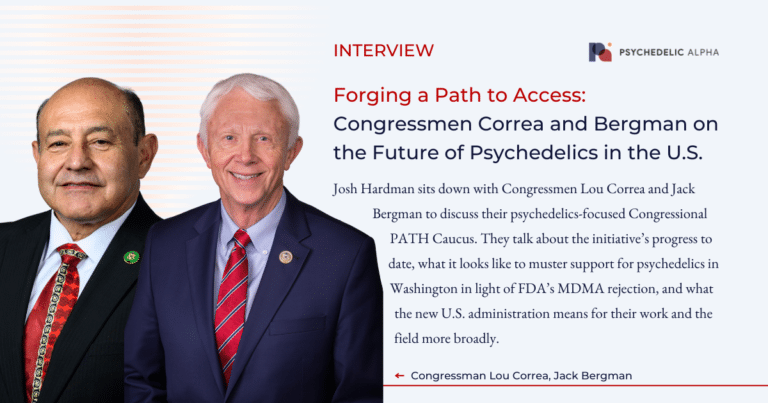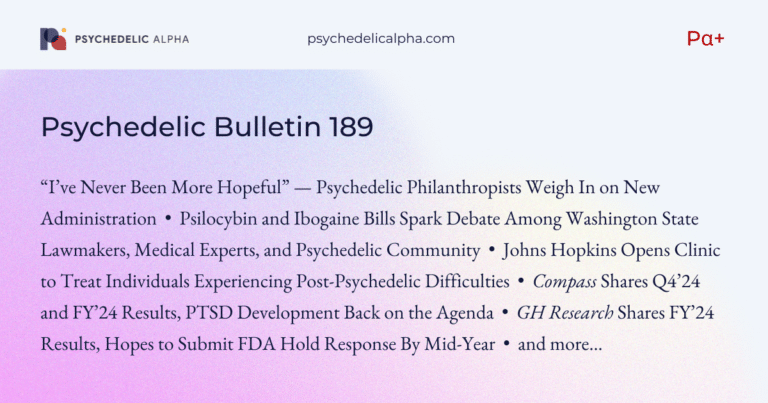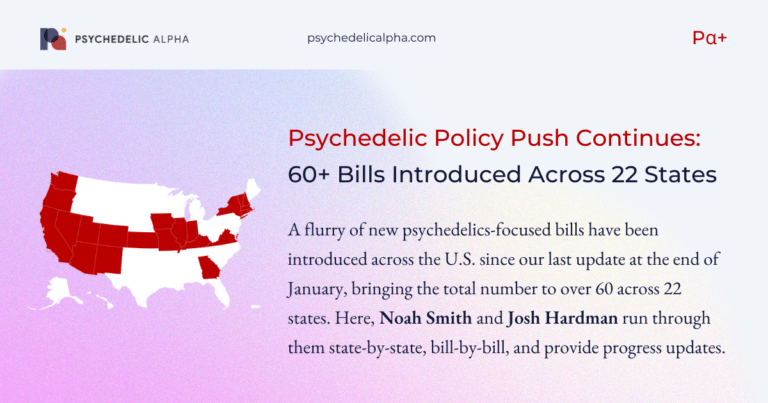As Colorado’s regulated psychedelics (‘natural medicine’) program’s rules were being developed there was a great deal of back-and-forth, much of which was tracked in near-real-time by the folks at Vicente LLP via our Colorado Natural Medicine Advisory Bulletin.
Now that the rules are set and license applications are open, we thought it would be helpful to provide a brief, straightforward overview of the program and its key regulations. Here, Healing Advocacy Fund’s Colorado Director, Tasia Poinsatte, does just that…
***
A guest article by Tasia Poinsatte, Colorado Director of the Healing Advocacy Fund.
Last month, Colorado officially wrapped up rulemaking for the state’s regulated natural medicine program. When Colorado healing centers open their doors this spring or summer, Colorado will become the second state in the nation where adults can legally access psilocybin care in facilitated sessions, with clear structures in place to support safety, accountability and access.
The adoption of a final set of changes in February marks the culmination of a process that has included two years of analysis and recommendations from the state’s 15-member Natural Medicine Advisory Board, months of extensive stakeholder engagement, convening of a 9-member Federally Recognized American Tribes and Indigenous Communities Working Group, and multiple rounds of rule changes. Creating this comprehensive set of rules involves a delicate balancing act of including the right guardrails to support public safety and insulate the program from federal scrutiny, while including enough flexibility to reflect the diverse reasons adults may seek access to legal psilocybin services – and importantly, keep costs down.
At some point, the rules will no doubt change again, as we transition from theory to practice and the insight that brings, but we now have a solid foundation to build from as the program goes live.
An innovative program to address mental health
Colorado is in the midst of a mental health crisis. Our state has one of the highest rates of adults facing mental health challenges and some of the lowest rates of access to care. In light of the scale of the crisis, Colorado voters in 2022 approved the creation of a new state program where adults 21+ can access psilocybin therapy as a promising alternative to address hard-to-treat conditions like anxiety, depression and addiction.
Similar to Oregon’s program, Colorado’s law does not require a diagnosis or prescription in order to access psilocybin therapy. Access requires a four-step process, including health screening, preparation, supervision during the psychedelic experience, and integration after the session.
Four-Step Process
Psilocybin therapy in Colorado is delivered in a four-step process, a model drawn from best practices in academic research settings as well as therapeutic settings from around the world.
- Initial Inquiry and Consultation: Clients complete a health screening focused on personal and family health history, medications and other factors that could affect their response to psilocybin. If risk factors are flagged, the client must consult with a qualified medical or mental health provider before moving forward with natural medicine services, or work with a clinical facilitator for whom those risk factors are within their scope of practice.
- Preparation: The client and facilitator meet to discuss intentions for the psilocybin administration session and to co-create a safety and support plan. Prior to the administration session, the facilitator must provide information about the effects of psilocybin, including potential risks and benefits, and obtain informed consent from the client. Preparation may occur in-person or remotely and may include multiple sessions.
- Administration Session: Psilocybin mushrooms or mushroom products are administered by trained and licensed facilitators who oversee the session and support the client throughout their experience. Administration may occur in individual or group sessions. Group sessions are limited to a maximum ratio of four clients to one facilitator for any dose larger than 2 mg total psilocin.
- Integration: The client and facilitator meet for an integration session to offer support to the client and review the administration session. Integration may occur in-person or remotely and may include multiple sessions. The facilitator may recommend follow-up care or make referrals to other healthcare providers or facilitators.
Healing Centers
Most psilocybin administration sessions must occur at licensed healing centers. A variety of locations may become licensed as healing centers in Colorado, including, for example, therapists’ offices, retreat centers, wellness centers, and more. Such locations may designate just one area as the “licensed premises” of the healing center, and Colorado’s rules allow flexibility for use of the space when not being used for an administration session, as long as all psilocybin is securely stored. Colorado rules for healing centers provide more flexibility than Oregon’s program to increase client access, though the Healing Advocacy Fund is committed to working with regulators and other stakeholders to increase the flexibility for service centers in Oregon.
Colorado includes two options for healing center licenses: micro and standard. The key differentiating factor for micro healing centers is a storage limit of 750 mg total psilocin or less (roughly 15-30 therapeutic doses, depending on the dose), while standard healing centers do not have a storage limit.
Individual administration sessions with clients who meet certain eligibility criteria may take place at two types of authorized locations other than a healing center: client homes or healthcare facilities. Sessions are allowed at authorized locations only for those who are in hospice, receiving palliative care, homebound or living with a disability. These sessions are subject to additional safety requirements, outlined in more detail below.
Clients must remain under the supervision of a licensed facilitator for a minimum period of time after consuming psilocybin. This requirement varies from 1 hour for 2mg total psilocin or less; 3 hours for a dose greater than 2mg and less than 10mg; and 5 hours for a dose of 10mg total psilocin or more. These are minimum session lengths, and the session may be extended at the discretion of the facilitator or request of the client.
Clients must have a safe transportation plan in place after an administration session that does not involve them driving.
Psilocybin Mushrooms: Cultivation, Manufacture and Testing
Psilocybin and psilocin used in Colorado’s regulated model must be sourced from a state-licensed cultivator or manufacturer and must be derived from mushrooms – not synthesized. Only certain product types are allowed, including whole mushrooms, powdered mushrooms, capsules, and tea bags. With an extraction endorsement, pressed tablets, chocolates, gummies and extracts are additionally allowed.
Products are subject to lab testing for contaminants (Shiga toxin-producing E. coli and salmonella) and tryptamine content analysis, and they must be labeled with potency measured in “total psilocin” (converting the psilocybin content to psilocin with a conversion factor). This is a departure from Oregon’s program, which only requires labeling of psilocybin. Requiring psilocin content on the label is an important safety feature and improvement from Oregon; still, some education will be needed here, given that most people are not used to thinking about potency in terms of total psilocin.
Although Colorado’s program technically allows extracts, they will be difficult to manufacture under the current rules since the rules prohibit elevated temperatures or removal of solvents. This could unintentionally restrict options to improve standardization and precision of dosing as Colorado’s program matures, and advocates have asked regulators to take a closer look at these rules in future.
Psilocybin products at all business types must be stored under lock and key and monitored by video camera. Anyone who directly handles psilocybin products during cultivation, testing, transport or transfer to a client must obtain a handler’s license from the Department of Revenue. Transport of psilocybin products is subject to detailed record-keeping and reporting requirements, including transportation manifests, designed to prevent diversion.
Facilitator Training
Facilitators in Colorado’s psilocybin therapy program must demonstrate completion of minimum training requirements intended to support safety, ethical practice and professional competency, ensuring a high quality of care.
Requirements include:
- 150 hours of classroom-style training covering everything from ethics to screening and drug interactions
- 40 practicum hours of supervised practice training where students will experience, facilitate, and observe altered states of consciousness (the “experience” category can count for a maximum of 10 of the required hours)
- 40 consultation hours in which students provide psychedelic care in consultation with an experienced facilitator, including evaluation of core competencies
- Complete a Basic Life Support (BLS) training
Students must obtain a training license in order to complete the practicum and consultation requirements.
Practicums must take place at licensed healing centers, and 30 of the required hours must be in-person administration sessions. The remaining 10 hours may be done remotely and must consist of hours spent in preparation, integration, or receiving consultation.
Consultation hours must be completed with a qualified consultant while the facilitator-in-training is directly providing natural medicine services under their training license, for which they may receive compensation from clients. Consultation must include a structured evaluation of the following competencies: non-directive approach; relational boundaries and use of touch; cultural competence; non-ordinary states of consciousness; self-care; and ethics.
Consultants must either hold a license to facilitate in Oregon or Colorado and have at least one year of facilitation experience, or be able to demonstrate 200 hours of experience facilitating with natural psilocybin if they are not licensed (e.g., traditional practitioners or underground facilitators).
Facilitator candidates may be permitted to complete accelerated training or be exempted from certain requirements if they provide proof of equivalent training or experience.
Facilitator Licenses
Multiple license types for psychedelic facilitators allow better integration of psychedelic therapy into our existing mental health system and tailor care to client needs.
- Clinical Facilitator License: Allows licensed medical and mental health providers to offer psychedelic therapy within their existing practice after completion of approved training
- Facilitator License: Allows those without a clinical license in therapy or medicine to provide psychedelic care after completion of approved training
- Distinguished Educator License: Allows experienced natural medicine practitioners to serve as practicum supervisors who are permitted to facilitate only in the context of training programs
- Training License: Requires facilitator candidates to practice under supervision for a period of time prior to obtaining a full facilitator license
All facilitators must abide by clear rules for standards of practice, required disclosures including information about potential risks and benefits, informed consent, adverse event reporting, and protecting client confidentiality. Facilitators must also complete 20 hours of continuing education annually to maintain their licensure.
Fees
Colorado’s fees for licensure are a bit more complicated than Oregon’s, with fees varying by business type as well as a requirement for each owner of a natural medicine business to separately obtain an owner’s license (this is to allow compliance with the restriction on any individual holding an ownership interest in more than 5 natural medicine businesses). Business fees in the first year are $3,000 for a micro healing center and $6,000 for a standard healing center. View the full fee schedule for business licenses here.
Turning to fees for facilitators, training licenses cost $420 for the first year and allow a facilitator to begin providing natural medicine services while they complete the required 40 consultation hours. After completing consultation, candidates must apply for a facilitator or clinical facilitator’s license, each of which are just shy of $1,000 per year. Fees will be reassessed annually and may be adjusted up or down depending on participation and costs to implement the program.
Looking Ahead
With this last piece of the program finalized, the first facilitated sessions in Colorado’s licensed program are expected to take place in early summer. There is a sense of excitement on the ground as winter shifts to spring and we move from the more cerebral phase of rulemaking to the hands-on work of bringing visions for businesses and nonprofits to life, supporting pathways to healing for people across Colorado and beyond.
***
For more about Healing Advocacy Fund’s work in Colorado, visit their website.





